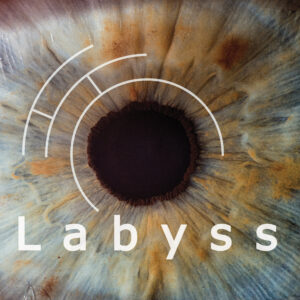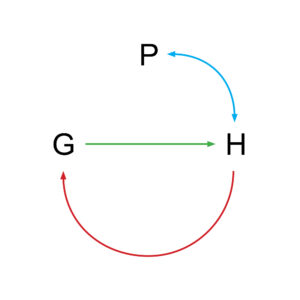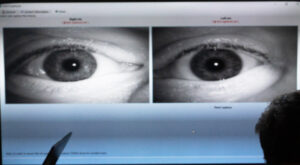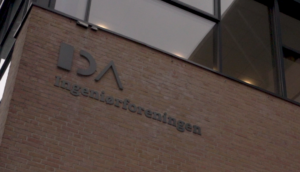
Spring 2023: First Labyss pop-up at Den Frie Centre for Contemporary Art
Performance and installation produced with Toaster and Den Frie Centre for Contemporary Art.

Spring 2022: Residency Art hub Copenhagen
For one month we developed a game that through an algorithmic logic can unlock participants’ memories. The residency ended with a two-day workshop with participants from the IT University of Copenhagen, the Faculties of Law and Computer Science at the University of Copenhagen and professionals from the performing arts world. This research led up to the production of Labyss.

Spring 2021: Development
Researching the use of algorithmic and biometric technologies in 2021. Specifically, we investigated the use of iris scanning as a tool to monitor and possibly control migrants and workers in the workplace. We created a series of test performances with the goal of creating narratives within an algorithmic structure. Among other things, we used personality testing systems such as OCEAN — used by Facebook.
The research project was done in collaboration with creative programmer Johan Bichel Lindegaard, Husets Teater and The Danish Society of Engineers
The development programme is supported by the Danish Arts Foundation

Winter 2020: Seminar by Ingeniørforeningen IDA (IDA)
2020: The COVID-19 situation saw an increased use of algorithmic technologies to monitor and measure citizens, and these technologies were legitimised and disseminated as necessary tools to control the virus.
This raises questions about what translates into code and what the implications of this increasing use of algorithmic technologies in our everyday lives mean.
In this seminar we presented research and perspectives on these questions from technological, mathematical, critical and artistic points of view.
Presentations:
“Trauma explained for robots” by Samara Sallam, visual artist, filmmaker, performer and coder
“Engineering Stupidity: the limits of surveillance and self-tracking” by Miguel Sicart, Associate Professor, Head of Centre, Digital Design, at the IT University of Copenhagen
“All models are wrong, but some are useful — On the myth of an all-seeing algorithmic eye (What do “they” know about us and who are “they”?)” by Irina Shklovski, Professor of Human-Centered Computing at the University of Copenhagen
“Worried but optimistic: Data modelling of the spread of COVID-19 in the population and its narratives” by Uffe Høgsbro Thygesen, Associate Professor at DTU Compute
The seminar was organised with the Danish Society of Engineers (IDA) and supported by the Danish Arts Foundation.
